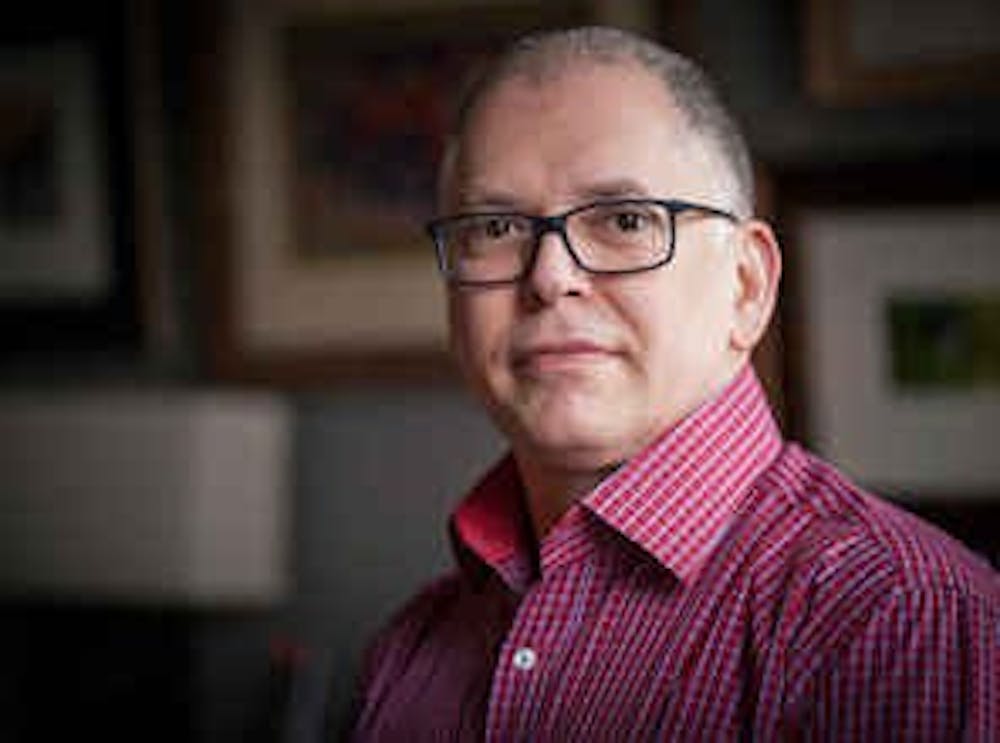Jim Obergefell, the lead plaintiff in last year’s case to legalize gay marriage across America, described his role in the case in a free lecture series this week.
He spoke at noon yesterday in the Moot Court Room in the Maurer School of Law. Obergefell will also speak today at 7 p.m. in Alumni Hall.
The Gay, Lesbian, Bisexual, Transgender Alumni Association, Union Board, American Constitutional Society and the Maurer School of Law worked together to arrange the lecture. Constitutional law professor Steve Sanders moderated the event.
After Obergefell’s partner of 20 years, John Arthur, was diagnosed with Lou Gehrig’s disease, the couple decided to marry. Ohio wouldn’t recognize their marriage, performed on the tarmac of Baltimore Airport in Maryland.
“We simply wanted to spend the rest of John’s days as husband and husband,” Obergefell said. “We really wanted our marriage to matter.”
The couple’s struggle to have Obergefell listed as the surviving spouse on the death certificate helped bring attention to the long-running fight for equal rights.
Aided by renowned civil rights lawyer Al Gerhardstein, their case initially won in a federal circuit court.
“There was some pushback to Al, saying ‘this isn’t the right fight,’” Obergefell said. But he kept fighting. “I relied on Al. I put my life, my love in his hands.”
Arthur died in October 2013, and, for a time, Obergefell said he retreated from the limelight to grieve. Then, in November 2014, the ruling was overturned in the sixth circuit court. He said that was his chance to back out and drop the case, but he didn’t.
“The decision upset me. It hurt me, it made me angry,” Obergefell said. “I knew I had to keep fighting for John.”
So, the couples and individuals involved appealed to the Supreme Court and eventually, aided by national civil rights organizations like the American Civil Liberties Union, the cases were heard.
Obergefell was pulled back into the limelight with the name of the case. It was randomly assigned by case number, he said, and the number of his original Ohio case was selected.
He said he never wanted to be the face of the fight because it involved so many other couples and individuals. But he said his mind has been changed somewhat by the overwhelmingly positive reaction of the public to the case.
“People stop and tell me stories,” he said. “They want to do nothing more than say ‘thank you.’”
After the case started to make headlines, Obergefell said he realized that he wanted to leave the quiet, private life he had sunk into after the sixth circuit court’s decision.
“I started to get more involved and more active,” he said. The speaking engagements helped him move through his grieving process, he said.
Obergefell made it his mission to be present for as many decision days as possible, traveling back and forth to Washington, D.C., for the first few weeks of June. On the day of the big decision, Obergefell was in the court room. He listened to Justice Anthony Kennedy read the opinion of the court, and Obergefell said he didn’t really hear it at first.
“It sunk in that we won, and I burst into tears,” he said. “It was this amazing feeling of ‘wow, we really do matter.’”
He attributes the time it took for the decision to be reached to the country’s past.
“It just seems to be the way our country works,” he said. “We just don’t get it.”
He said the next step is the Equality Act. The Act would adapt the 1964 Civil Rights Act and “establishes explicit, permanent protections against discrimination” of the LGBT community, according to hrc.org.
“Passing the Equality Act to add sexual orientation and gender identity to constitutional protection,” he said. “That’s the big fight.”






